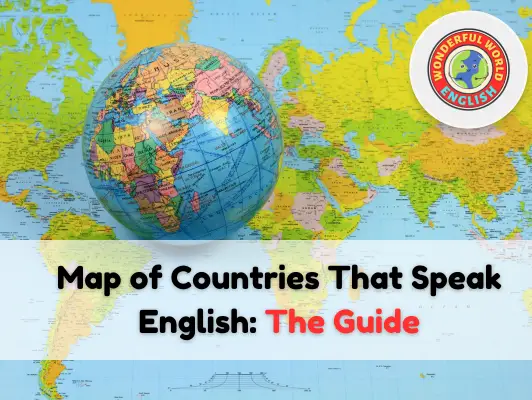Contents
Toggle
Meet David De’ Ath, founder, editor, and writer at Wonderful World English. With his extensive background as an English teacher, David provides valuable insights and practical tips on ESL for students and teachers alike.
English, a language that originated in England, has become a global lingua franca.
Around the world, English can be found as an official, administrative, or cultural language in numerous countries and territories.
Its proliferation is closely tied to the history of British colonization and the subsequent adoption of the language in various domains such as education, government, and international business.
The spread of the English language has resulted in a map that highlights its status as the official or national language in over 50 sovereign states and numerous non-sovereign entities.
English also holds a position of prestige and is often used as a primary language in global commerce, science, and the internet.
This widespread use has reinforced its role in international communication and relations.
Inquiry into the nations where English is an official language sheds light on how it shapes the interactions between citizens and government officials, and how it continues to influence societal norms and business practices.
The language’s adaptability and its historical journey have solidified its place in the fabric of global communication.

All countries in blue hold English as an official language.
Global Distribution of English
The English language boasts a widespread global presence, being an official language in numerous countries across various continents and a pivotal lingua franca in international affairs.
Its roots trace back to the influence of the British Empire and continue to expand with globalization.
English in Different Continents
English has a significant footprint across all inhabited continents. In North America, the United States and Canada are predominantly English-speaking.
Africa sees countries like South Africa and Nigeria using English as one of multiple official languages.
Moving to Europe, nations such as the United Kingdom and Ireland are native English-speaking, while many Europeans learn it as a second language.
Asia presents a diverse linguistic landscape with countries like India, Singapore, and Philippines incorporating English into their official communications.
In Oceania, Australia and New Zealand are key native English-speaking countries.
Countries Where English Is an Official Language
English holds an official status in over 50 nations.
Examples include the UK in Europe, Jamaica in the Caribbean, and Kenya in Africa.
Various Asian countries like India, Singapore, and Philippines also maintain English as an official administrative language.
English as a Second Language
In nations where English is not an indigenous language, it often thrives as a second language.
This is common across Europe—in countries such as the Netherlands and Germany—and in parts of Africa and Asia, including regions where French, Spanish, or German were historically dominant.
Are you interested in finding out about how you can become a part of the English teaching world?
Teaching ESL can be one of the most enriching adventures, be sure to check out the link below for more information!
Related: How to Teach English Overseas: Ultimate Guide
Historical Influence
The spread of English can largely be attributed to the expansion of the British Empire, which established colonies around the globe.
Countries such as the USA, Canada, Australia, and parts of the Caribbean like Jamaica, reflect this historical influence in their official language.
English-Speaking Territories
Beyond independent nations, English is the official language of various non-sovereign entities and territories such as Bermuda, Cayman Islands, Gibraltar, and Montserrat.
English Variants
Different countries and regions have developed their own variants of English, such as American English in the USA and British English in the UK.
These variants can differ significantly in vocabulary, spelling, and pronunciation.
Population of English Speakers
The USA leads with the highest population of English speakers, while significant numbers are found in India, the United Kingdom, Canada, Australia, and the Philippines.
International Organizations and English Language
English serves as a primary lingua franca within international organizations such as the United Nations and the European Union, facilitating cross-border communication.
Language and Integration
English acts as a critical tool for integration and cultural exchange, especially in regions with high linguistic diversity such as Asia and Africa.
English in Non-Sovereign Entity
In non-sovereign territories like Hong Kong, Puerto Rico, and the Isle of Man, English plays a complex role alongside local languages, reflecting historical and cultural ties with the English-speaking world.
English Language Influence
The widespread use of English, often termed the lingua franca of the modern era, is deeply ingrained in numerous aspects of global interaction.
It has established itself as the predominant language in many international fields, thanks to historical and contemporary reasons spanning from the expansion of the British Empire to the cultural and economic influence of countries like the United States.
Business and Trade
In business and trade, English serves as a critical link between markets and professionals across continents.
For instance, in Asia, nations such as Singapore use English as an official language to negotiate trade agreements and conduct business on an international scale.
It is also common for companies headquartered in non-English speaking European countries to adopt English to appeal to a global customer base and maintain a competitive edge.
Education and Research
English-language publications dominate education and research, with the majority of scientific papers published in English, irrespective of the authors’ native languages.
Educational institutions from countries like India and the Netherlands often offer programs in English to attract international students and facilitate academic collaboration.
Cultural Impact
The cultural influence of the English language is undeniable.
From the prevalence of English-language music and films originating in the United States and United Kingdom to the use of English in various media, it’s a driving force in shaping global entertainment.
Countries around the world consume and produce content in English, making it a staple in entertainment circles.
For a map of countries that do NOT speak English, click the link below!
Related: Countries That Don’t Speak English: An Insightful Guide
Technology and Internet
English’s dominance is particularly evident in the fields of technology and the internet, where it is the primary language of communication.
Major technology companies, many of which are based in the USA, use English as their working language and a significant portion of internet content is written in English, making accessibility a priority for non-native speakers.
Political and Diplomatic Language
English’s role on the international political stage is substantial.
It is one of the six official languages of the United Nations and is often the preferred language in diplomatic discourse.
Countries like Malta and Ireland, which are English-speaking, participate in international dialogues via this common linguistic medium.
Tourism and Travel
Finally, English’s reach extends into tourism and travel.
Countries including New Zealand, Australia, Canada, and Ireland, boost their tourism industries by advertising attractions in English to draw international travelers.
Moreover, English often comes in handy for tourists as a second language when they traverse through various nations, easing communication barriers.
With English as an influence across various spheres, it weaves a thread of cohesion among diverse linguistic landscapes and contemporary global dynamics.

Conclusion
Teaching English overseas combines the challenge of adapting to new cultural environments with the reward of aiding in the global spread of the English language.
Obtaining the necessary certifications such as TEFL, researching potential destinations, and understanding the specific requirements and conditions of each location are essential steps for success.
Educators must be prepared to navigate different educational systems, legal requirements, and cultural norms.
Those who take on this adventure will not only enhance their professional capabilities but also experience significant personal growth and cultural enrichment.
Engaging fully in this journey allows teachers to make lasting impacts on their students’ lives while broadening their own perspectives through immersive cultural experiences.
We hope you find value in this information; you can contact us if you need any assistance.
Have a wonderful day!
Image Attribution: All images licensed via canva.com





